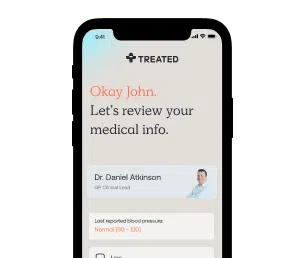Summary
- Allergies are your body’s immune response to a specific trigger.
- Common allergies include grass and tree pollen, pet hair, and specific foods.
- Allergies range from mild to severe, which can cause life-threatening anaphylaxis.
What are allergies?
Allergies are an overreaction by your body to a specific trigger that doesn’t cause the same reaction in other people. Your body produces an immune response to something that it wrongly views as a threat. This shows as a reaction in your skin, sinuses, digestive system or your airways (or a combination of these).
The severity of allergies can vary from person to person. For some people, an allergic reaction can be a relatively mild reaction, but others can experience anaphylaxis, which is a potentially life-threatening situation. Allergies can appear at any time in your life, even if you haven’t previously experienced them.
Some of the most common allergies include: food allergies, dermatological allergies (when your skin comes into contact with something that causes a reaction), grass and tree pollen (also known as hay fever), animal hair, mould, latex, dust mites, medicines, household chemicals and insect bites.
Who gets allergies?
Allergic reactions can happen to anyone at any time. It’s thought that they can be hereditary and if you have parents who also experience allergies you may also experience them too. You can also be allergic to more than one thing - even things that are seemingly completely unrelated.
Allergies are most common in children and they can fade in severity as you get older, though they don’t always fade in this way. However, sometimes the opposite can happen and you can develop new allergies in adulthood, even if you’ve never previously experienced a reaction to something before.
How common are allergies?
Allergies are really common. It’s estimated that there are millions of people around the world who are affected by allergies at some point in their lives with as much as 40% of the global population showing sensitivity to factors in their environment.
More and more people are suffering from allergies each year, particularly food allergies. Where you live and your lifestyle can have an effect on your allergies, especially if you have certain types of environmental or food-based allergies.

How we source info.
When we present you with stats, data, opinion or a consensus, we’ll tell you where this came from. And we’ll only present data as clinically reliable if it’s come from a reputable source, such as a state or government-funded health body, a peer-reviewed medical journal, or a recognised analytics or data body. Read more in our editorial policy.
What causes allergies?
The exact reasons why we experience allergic reactions are relatively unknown, especially the reasons for being allergic to some things but not others. Our environment plays a part in the cause of these allergic reactions, as do our genetics.
One theory is that a lack of exposure to germs at a young age can stop the immune system from working properly. This means that it perceives certain things in your environment as a threat and overreacts with an immune response. It’s even thought that the size of your family can have an impact, as larger families have more exposure to different types of bacteria.
When you experience an allergic reaction, it’s your body's reaction to something in the environment that it decides is a threat. Your white blood cells react to protect your body and release histamines, which is what causes the visible symptoms of an allergic reaction, such as inflammation and swelling.
What are the symptoms of allergies?
There are some common symptoms of an allergic reaction. These can vary from person to person, and you might experience some of them or all of them during an allergic reaction. Common allergy symptoms include:
- skin reactions such as dry, red and cracked skin, or an itchy rash that may be raised or appear red
- sneezing, coughing or wheezing
- a tight chest or shortness of breath
- swelling of the lips, tongue, eyes or other parts of the body
- sickness, diarrhoea or nausea
The symptoms of an allergic reaction will depend on how you have come into contact with an allergen and whether or not you’ve ingested, inhaled or touched whatever’s triggered your allergy. Symptoms will also vary in severity from person to person and can even be different each time your body reacts.
Can allergies lead to other problems?
Most allergy reactions are pretty mild and don’t cause any other health problems. But they can be frustrating and uncomfortable to deal with. If you haven’t experienced an allergic reaction before it can feel overwhelming or unexpected.
Some allergic reactions can be really serious. A severe allergic reaction can lead to anaphylaxis, which can be life-threatening. It’s where the body seriously overreacts to an allergen by causing breathing difficulties, wheezing, feeling lightheaded, a fast heartbeat, clammy skin, confusion and even collapsing or becoming unconscious, as well as other symptoms.
If you experience these symptoms, you should call an ambulance immediately, and whatever’s causing the reaction should be avoided. If this has happened previously, a person may carry an emergency adrenaline auto-injector pen (also known as an EpiPen) with them to help deal with symptoms. Anaphylaxis is a serious medical emergency.

How we source info.
When we present you with stats, data, opinion or a consensus, we’ll tell you where this came from. And we’ll only present data as clinically reliable if it’s come from a reputable source, such as a state or government-funded health body, a peer-reviewed medical journal, or a recognised analytics or data body. Read more in our editorial policy.
What medications are there for allergies?
Whilst there isn’t a ‘cure’ for allergies, they can be treated. The treatment you use depends on the type of allergy that you have, and helps you relieve and reduce the symptoms you experience during an allergic reaction. Some medications prevent your body from reacting to allergens in your environment. For pollen and grass allergies, eye drops, nasal sprays and antihistamine tablets are often used to prevent the allergic reaction from developing. Antihistamine tablets can be used to treat a wide range of allergies and reactions. Emergency adrenaline pens should only be used to treat anaphylactic shock and shouldn’t be used for milder allergic reactions, as they aren’t safe for general use.Is there a ‘best’ treatment for allergies?
The right treatment for your allergy depends on the nature of your allergic reaction and your own personal preference. Your lifestyle may also make it easier to use some forms of allergy treatment than others. When you speak to our clinicians, talk to them about your health and lifestyle so that they can advise you on a range of suitable treatments that will fit into your daily life.Do allergies always need treatment?
You can help to tackle allergies if you recognise your triggers and then avoid them. Sometimes this isn’t very easy, especially if you’re allergic to something like grass pollen, so in this case treatment will help you to minimise the discomfort you experience as a result of your allergy. This means that you can continue to enjoy your life without your allergy having a negative impact on it.
How we source info.
When we present you with stats, data, opinion or a consensus, we’ll tell you where this came from. And we’ll only present data as clinically reliable if it’s come from a reputable source, such as a state or government-funded health body, a peer-reviewed medical journal, or a recognised analytics or data body. Read more in our editorial policy.
FAQ: Allergies
Have something specific you want to know? Search our info below, or ask our experts a question if you can’t find what you’re looking for.
How are allergies diagnosed?
Are there different types of allergies?
- skin allergies - common triggers include latex and household cleaning products
- food allergies - common triggers include peanuts, eggs and fish
- respiratory allergies - common triggers include animal hair, mould, dust mites and pollen
Are there tests for allergies?
- blood tests - these are used to help diagnose common allergies and involve taking a blood sample which is then analysed.
- skin prick testing - if you suspect you might be allergic to something specific, a drop of liquid that contains the potential allergen is placed onto your skin and then your skin is pricked
- patch tests - usually used for skin allergies (such as contact dermatitis), a patch is taped to your skin that contains the suspected allergen to check for reactions
- elimination diet - this is used for suspected food allergies and involves avoiding a food that is thought to be the cause of your allergy before reintroducing it under the careful supervision of a clinician
- challenge testing - this is used for food allergies and tests how you react to the suspected cause of your allergy by giving you the food you think you’re allergic to in gradually increasing amounts
Can you get side effects from allergy treatment?
Do allergy treatments always work?

How we source info.
When we present you with stats, data, opinion or a consensus, we’ll tell you where this came from. And we’ll only present data as clinically reliable if it’s come from a reputable source, such as a state or government-funded health body, a peer-reviewed medical journal, or a recognised analytics or data body. Read more in our editorial policy.
Allergic diseases and asthma: a global public health concern and a call to action. World Allergy Organization Journal, 7, p.12. 2014.
Food allergy: is prevalence increasing? Internal Medicine Journal, 47(3), pp.256–261. 2017.
The Hereditary Basis of Allergic Disease. American Journal of Human Genetics, [online] 75(2), pp.349–350. 2004.
- Genetic risk factors for the development of allergic disease identified by genome-wide association. Clinical & Experimental Allergy, 45(1), pp.21–31. Available at:
- Too clean, or not too clean: the Hygiene Hypothesis and home hygiene. Clinical Experimental Allergy, 36(4), pp.402–425. Available at:
Anaphylaxis
Always have the emergency treatment you need, ready to hand. Chat to us for advice on allergy pens.
Your partners in health
Dr Daniel Atkinson
GP Clinical Lead
Registered with GMC (No. 4624794)
Meet DanielMs Sanjeda Chowdhury
Superintendent Pharmacist
Registered with GPhC (No. 2202465)
Meet SanjedaMr Craig Marsh
Pharmacist Prescriber
Registered with GPhC (No. 2070724)
Meet Craig
Some treatments can cause side effects
Always read the leaflet that comes with your medication and tell us about any side effects you get.
Choose how you do healthcare.
We know health, but you know you.
Our experts tell you what’s safe, but you decide what’s best.
Consult on your own time
Answer a few questions and tell us about yourself. Get tailored advice from our clinicians so you can choose better.

Treatments to fit your life
Choose your treatment and how often you have it delivered.

Your health,
continued
We know things change. It’s the nature of life. We’ll check in regularly to make sure your treatment is still right for you.
Control at your fingertips
Pause. Change. Skip. Start again. Any time you like.
More general health
Here are some other things we can help with.
Fungal nail
Choose from our range of tablets and solutions. Get ongoing care and support from our experts.
Stop smoking
Stop smoking treatments that can help you kick the habit forever, and reduce your risk of disease.
Weight loss
Tablets or injections. Tailored weight loss treatments combined with ongoing support from our experts.
Give us the inbox treatment.
We're making healthcare more about you. Sign up to our newsletter for personalised health articles that make a difference.
Disclaimer: The information provided on this page is not a substitute for professional medical advice, diagnosis, or treatment. If you have any questions or concerns about your health, please talk to a doctor.